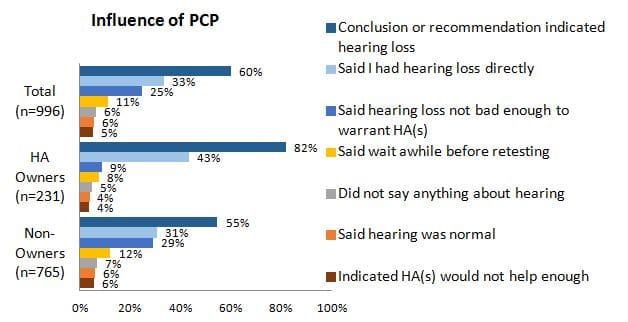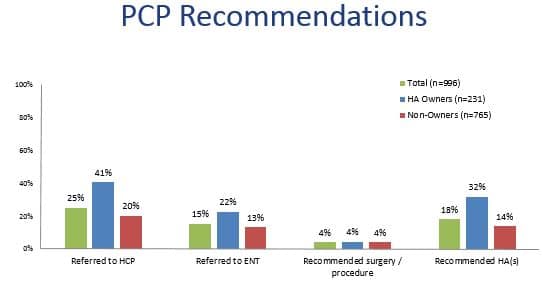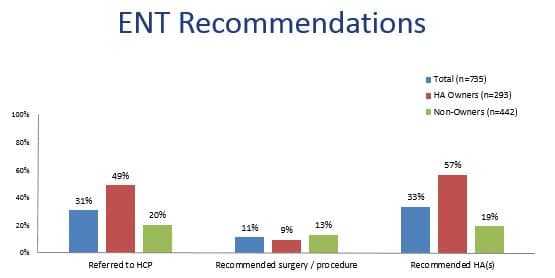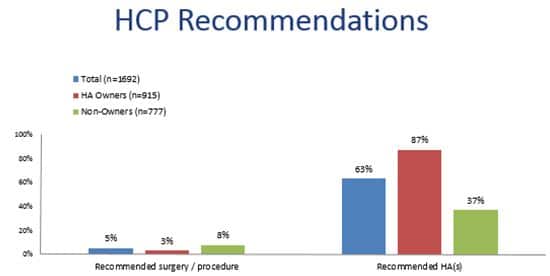“Peeling the Onion” is a monthly column by Harvey Abrams, PhD.
As John takes action to purchase hearing aids, he is likely to proceed on the perception that hearing aids are medical devices, according to MT9 survey data reported in last week’s post. Assuming he follows the medical path, he can consult a variety of professionals, including an ENT, his primary care physician (PCP), or a hearing care professional (HCP).
Even though John is less likely to purchase hearing aids when he consults with his PCP instead of an HCP, the influence of the PCP on the purchase decision in very important. That is the subject of today’s post.
John Visits His PCP
As Figure 1 illustrates, 82% of the MT9 respondents who eventually purchased hearing aids reported that their doctor concluded that they had a hearing loss. When the PCP suggested that their hearing loss was not bad enough for hearing aids, less than 10% of MT9 survey respondents ended up purchasing hearing aids (Fig 1).

Figure 1. The influence of primary care providers on hearing aid ownership. PCP = primary care providers; HA = hearing aid
Compare this to non-owners where 55% of them reported that their doctor concluded that they had a hearing loss and almost 30% reported that their doctor said their hearing loss was not bad enough for hearing aids.
Figure 2 further illustrates the influence of the PCP as shown by the percentage of respondents who reported which specific recommendations were made by their PCP.

Figure 2: Specific recommendations of primary care provider as reported by MT9 respondents who visited a PCP to discuss their hearing difficulties. PCP = primary care provider; ENT = ear, nose and throat specialist; HA = hearing aid
Approximately one third of eventual hearing aid owners reported that their PCP specifically recommended hearing aids. Over 40% were referred to a HCP where, presumably, hearing aids were more likely than not to be recommended.
Clearly, the PCP is influential in the decision regarding hearing aid adoption either through a direct recommendation or as a result of their referral practices.
John Visits an ENT
If we examine the influence of ENT specialists, the MT9 data suggest that over 90% of eventual hearing aid owners reported that the specialist concluded that they had a hearing loss. Less than 10% of that group reported that the specialist advised against hearing aids.
By contrast, 69% of non-owners reported that the specialist concluded that they had a hearing loss. Over 30% of those reported that the specialist advised against hearing aids.
As illustrated in Figure 3, among those who visited an ENT specialist, almost 60% of eventual hearing aid owners reported that the ENT physician specifically recommended hearing aids and almost 50% reported that they were referred to a HCP.

Figure 3: Specific recommendations of ENT specialist as reported by MT9 respondents who visited an ENT specialist to discuss their hearing difficulties. ENT = ear, nose and throat specialist; HCP = hearing care provider; HA = hearing aid
John Visits an HCP
Finally, and perhaps not surprisingly, almost 90% of those who eventually purchased hearing aids reported that the HCP recommended hearing aids (Figure 4).
However, it’s interesting to note that 67% of non-owners also reported that the HCP recommended hearing aids. There can be a number of reasons, many of which you are undoubtedly familiar with, why individuals fail to follow the HCP’s recommendation, to include the perception that their hearing loss isn’t “bad enough” for hearing aids or they can’t afford the costs associated with purchasing hearing aids.
More about these issues as we continue on John’s journey in future posts.
References
1Abrams HB, Kihm J. (2015). An introduction to MarkeTrak IX: new baseline for the hearing aid market. Hearing Review, 22(6):16-21.
Harvey Abrams, PhD, is an audiology consultant in the hearing aid industry. Dr. Abrams has served in various clinical, research, and administrative capacities in the industry, the Department of Veterans Affairs and the Department of Defense. Dr. Abrams received his master’s and doctoral degrees from the University of Florida. His research has focused on treatment efficacy and improved quality of life associated with audiologic intervention. He has authored and co-authored several recent papers and book chapters and frequently lectures on post-fitting audiologic rehabilitation, outcome measures, health-related quality of life, and evidence-based audiologic practice. Dr. Abrams can be reached at harvey_abrams@starkey.com
This is Part 14 of the Peeling the Onion series. Click here for Part 1, Part 2, Part 3, Part 4,Part 5, Part 6, Part 7, Part 8, Part 9, Part 10, Part 11, Part 12, Part 13.
feature image by Ross Land/Getty









Thank you for the survey analysis which really just confirms what we already knew. That is that PCP are a trusted professional that significantly influence the patients journey to receiving appropriate hearing rehabilitation. This is a valuable pathway that requires nurturing to reduce some falling through the gaps of poor advice. We all understand the best person to give advice is an Audiologist. Unfortunately insurance systems rely on the PCP as a gatekeeper to access hearing rehabilitation services which does not always yield the optimal outcome. I don’t think this is ever going to change so working within the existing system to provide ongoing medical education must be a high priority for the Audiologucal profession.